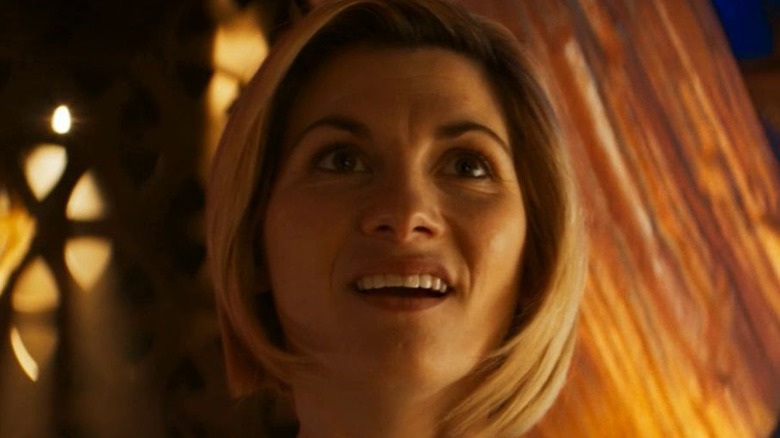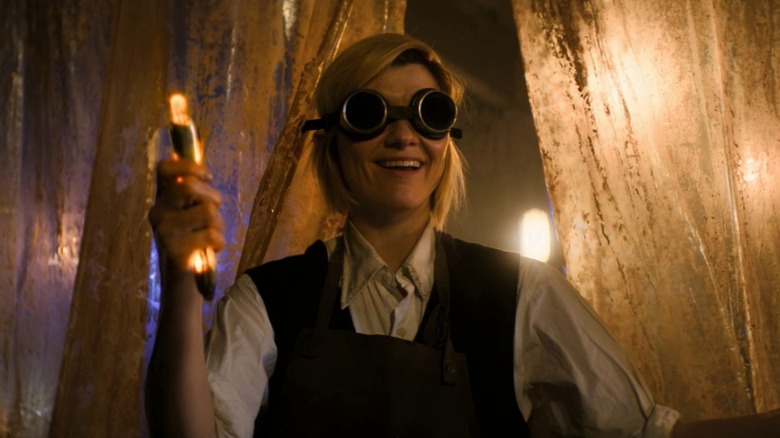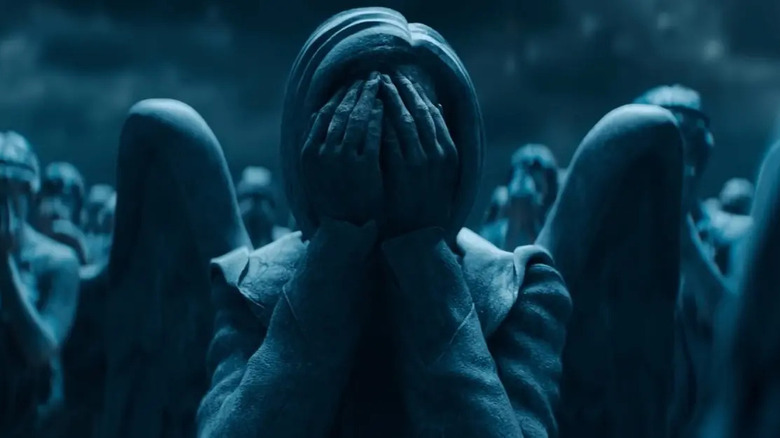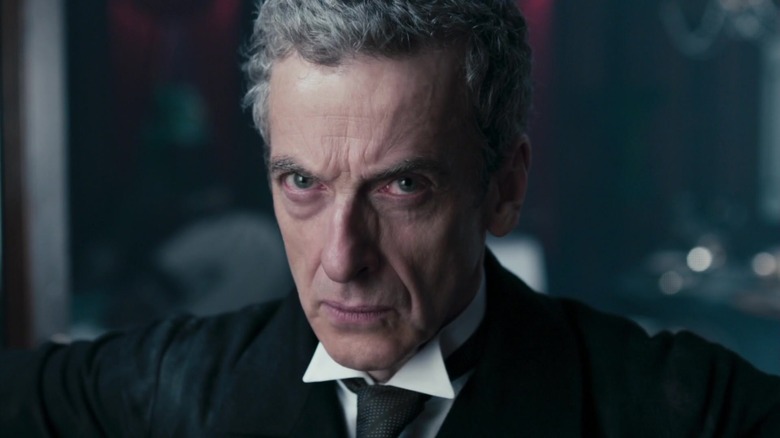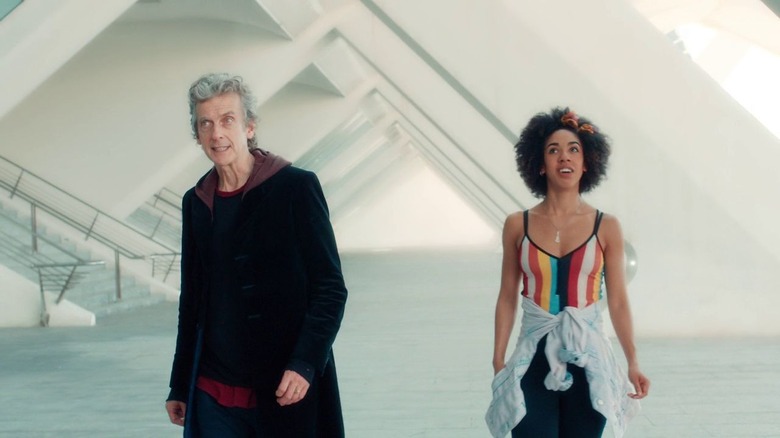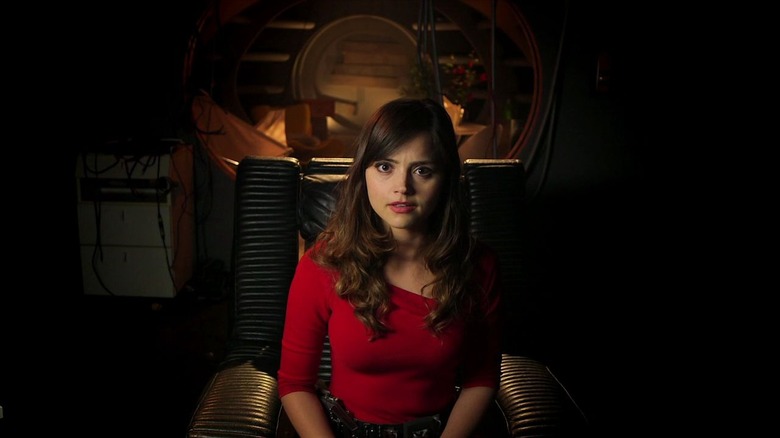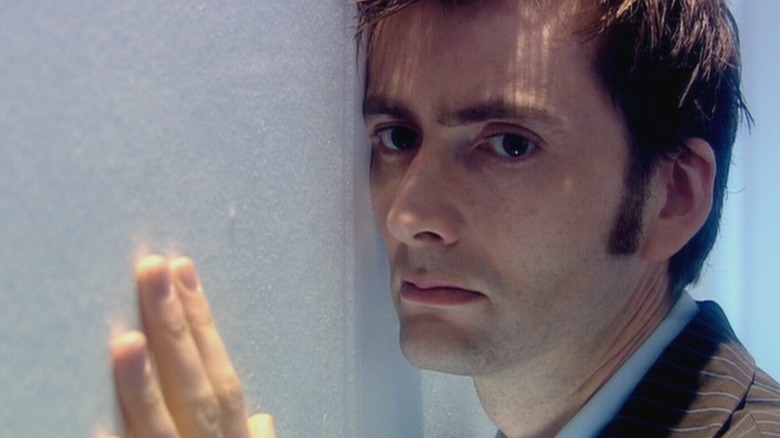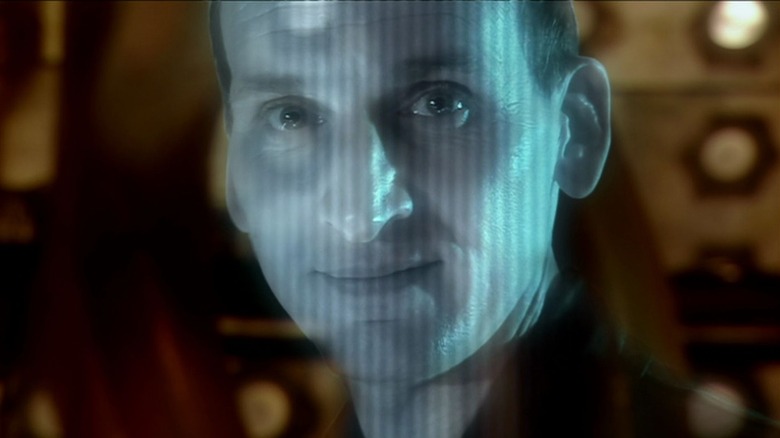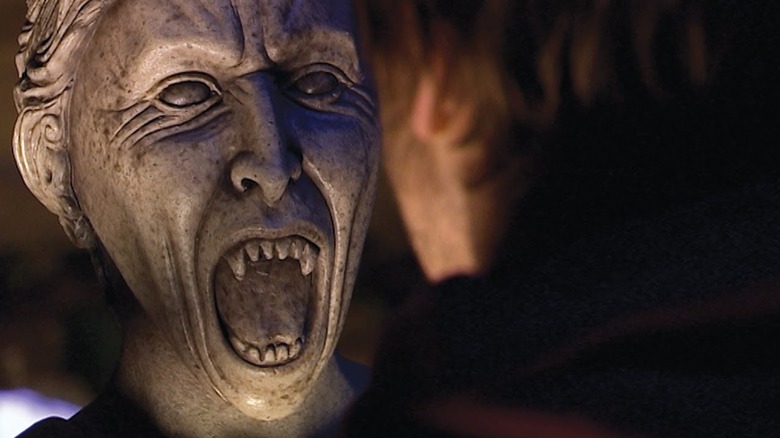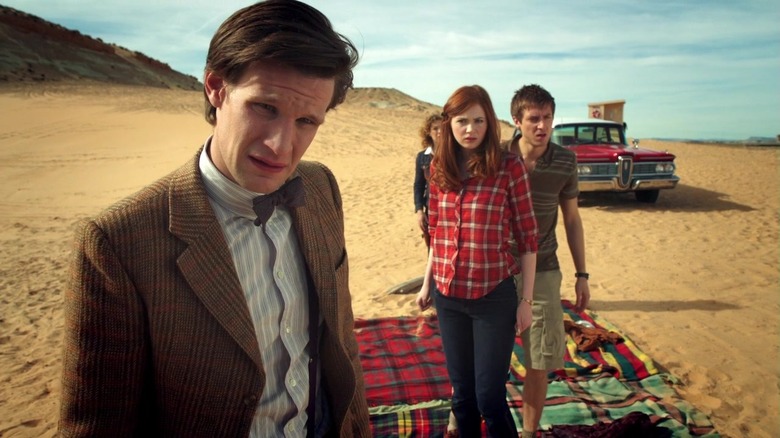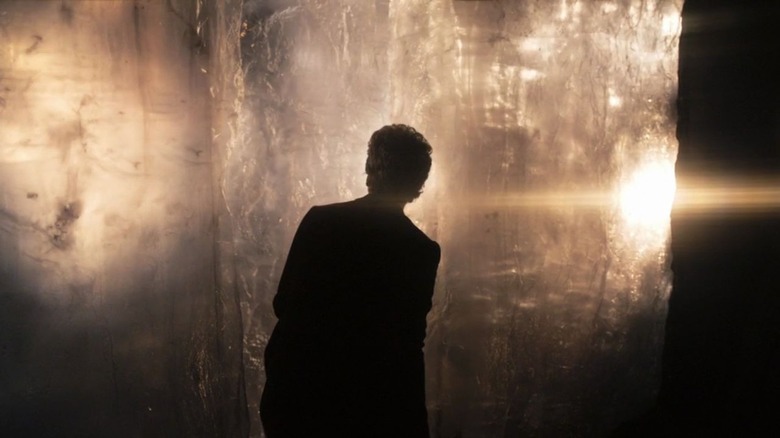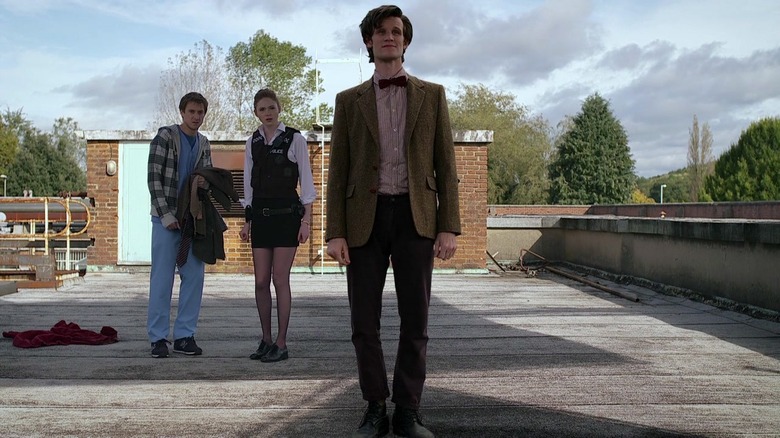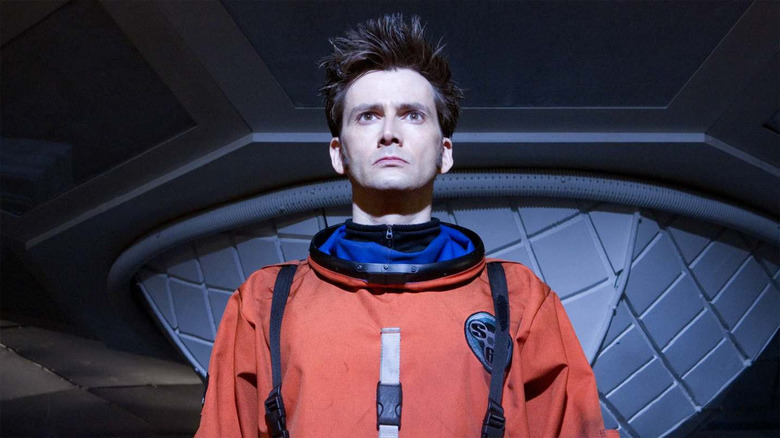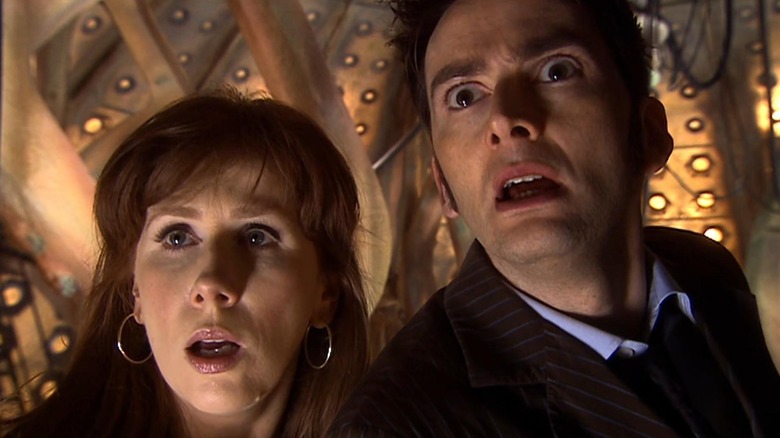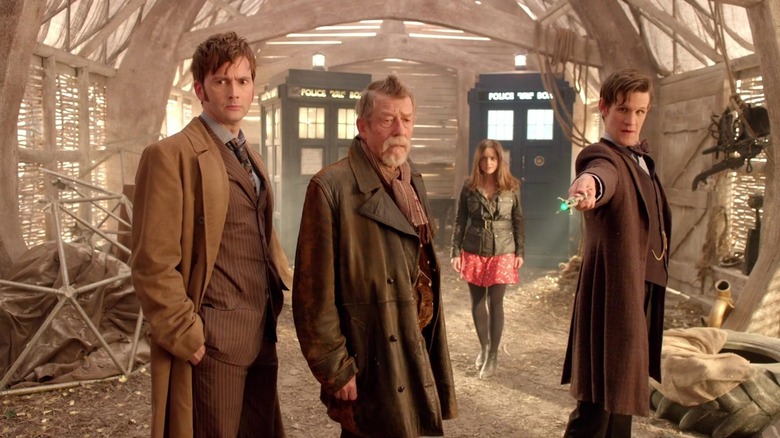Every Season Of Modern Doctor Who, Ranked Worst To Best
Any fan of "Doctor Who" will tell you that the Doctor's adventures have a long and rich legacy. In fact, having first aired in November 1963, "Doctor Who" has been recognized by Guinness World Records as the "Most prolific science-fiction TV series (by episode)." According to Metro, the show has produced an astonishing 868 broadcast episodes by the end of 2021.
After a long hiatus as a result of declining ratings in the late 1980s, "Doctor Who" was revived in 2005 by the acclaimed writer Russell T Davies. Since then, fans have enjoyed 13 whole seasons and two separate rounds of specials. Of course, most audiences will agree that the quality of "Doctor Who" is by no means consistent. In fact, it's not unheard of for one episode to be a disaster and the very next one to be a masterpiece. As you'd imagine, then, each of these seasons can vary wildly in quality, and ranking them isn't necessarily an easy thing to do.
Nevertheless, if you take an average of each season's IMDb score, you can at least get a pretty decent approximation of its quality in relation to the others — and that's exactly what we've done here. From dizzying highs to cringe-worthy lows, this is every season of modern "Doctor Who" ranked from worst to best.
15. Series 11
Airing in late 2018, Series 11 of "Doctor Who" is the first to introduce Jodie Whittaker's Thirteenth Doctor to the show. This was, for a while at least, an incredibly exciting prospect: Whittaker was the first female Doctor, she was to be accompanied by a larger TARDIS team for the first time since Series 1, and it felt like the show was about to get a fresh burst of energy with a new showrunner, Chris Chibnall, taking control.
Sadly, Series 11's execution leaves a lot to be desired. Aside from holding the distinction of featuring two of the show's lowest-rated post-2005 episodes up until this point — "Arachnids in the UK" and "The Tsuranga Conundrum" — even the season's better episodes just don't cut through. "Demons of the Punjab" and "It Takes You Away" may have taken the season in slightly more interesting directions, for example, but you'd be hard-pressed to find any fan of the show who can remember too much about either.
The only exception to the disappointment of Series 11 is "Rosa," a historical episode in which the Doctor and her "fam" meet Rosa Parks. Easily the best episode of the season, "Rosa" was described by Rachel Leishman of The Mary Sue as "one of the greatest episodes from the show" itself, even after five decades on the air. Sadly, it isn't quite enough to save Series 11, and the Thirteenth Doctor's first outing sinks to the bottom of the pile.
14. Series 12
Poor old Thirteen just can't catch a break. Viewers who hoped that Chris Chibnall and Jodie Whittaker's uneven first attempt might have been an unlucky fluke were likely disappointed after Series 12 aired. Still, as critic Alex Moreland wrote in his review of Series 12, this one at least "failed in interesting ways."
"Spyfall," the action-packed two-part opener, offers a little hope that things are looking up, which would be quickly dashed by the much-maligned "Orphan 55." This episode, which finds the Doctor uncovering a deadly secret about humanity at an idyllic spa, is far and away the lowest-scoring of new "Doctor Who" on IMDb; not even the original run's worst moments reached such devastating lows.
Little of Series 12 is worthy of note, unfortunately, although "Fugitive of the Judoon" did at least make headlines with the genuinely shocking introduction of the so-called "Fugitive Doctor." Sadly, Chris Chibnall's attempts to further toy with the show's canon (which drew so many complaints from viewers that the BBC was actually forced to respond) drag things down towards the season's end. Most significantly, efforts in "The Timeless Children" to fully explain the Doctor's childhood feels like a final nail in the coffin of the character's once-mysterious nature. All in all, Series 12 may have failed in interesting ways — but, that provides consolation.
13. Series 13: Flux
Better known as "Flux," the 13th season of "Doctor Who" did something that the show hasn't attempted since 1986's "Trial of a Time Lord": tell one overarching story over the course of an entire season. That said, "Flux" was a drastically shortened serial by "Doctor Who" standards, featuring just six episodes in as many weeks.
Unfortunately, the ambitious storytelling "Flux" hopes to pull off is hampered by Chris Chibnall's continuing insistence on deep-diving into the mythology of "Doctor Who." The result? A hugely complicated and nigh-incomprehensible mess of competing side plots, unnecessary side characters, and bizarre tonal beats, including a Doctor who seems worryingly comfortable with committing genocide.
"Village of the Angels" provides the only real highlight of "Flux," offering a genuinely scary new spin on the classic villains, but even this is dragged down by the season-wide arc. Things aren't helped by the fact that the final episode, "The Vanquishers," leaves whole plotlines unresolved and provides few satisfying answers to the season's many questions. Perhaps "Flux" is best summed up by Escapist critic Darren Mooney. In his review of the final episode, Mooney wrote that "'The Vanquishers' ends 'Flux' with a cacophony of sound and fury, signifying... well... very little."
12. Series 8
Putting aside "The Time of the Doctor," which IMDb erroneously includes as part of Series 8 (we've grouped it with the Eleventh Doctor's other specials instead), this season is best known for debuting Peter Capaldi's Twelfth Doctor.
Twelve is a gruffer and scarier Doctor than his floppy, loveable predecessor, which might explain why many viewers had trouble getting into his first season. Series 8 is also marked by a string of standalone episodes that are bizarrely high-concept even for "Doctor Who." (The Doctor goes inside a Dalek! The moon is an egg! Trees take over London!) It's little wonder, then, why the fan reception seems to have been mixed.
But Series 8 did feature some impressive highs. "Flatline," "Mummy on the Orient Express," and "Listen" make the most of wild concepts; the latter in particular is a superb adventure that Neela Debnath of The Independent called "Steven Moffat's most terrifying episode to date." Series 8 also settles into a more consistent level of quality, with only "Kill the Moon" and "In the Forest of the Night" as low points — and even they surpass the highest-scoring episodes of Series 11 and 12. In the end, the Twelfth Doctor's first collection of adventures may be a little unsteady. But this season does at least take the show to fascinating new corners of the universe.
11. Series 10
The Twelfth Doctor's final season, Series 10 is almost the dictionary definition of "good, but not great." Notably, few episodes score above an 8.0, but only one is rated lower than a 6.0.
But that's not to say the "great" isn't there. Standout episodes in Series 10 include the final two-parter, "World Enough and Time" and "The Doctor Falls," which feature the return of John Simm's Master and place him opposite his own gender-swapped self, played by Michelle Gomez. Coupled with the looming inevitability of Twelve's regeneration, this makes for a finale that is equal parts hilarious, horrific, and heartbreaking — one that Alasdair Wilkins of The AV Club called, "the best series finale in all-new 'Doctor Who.'"
Showrunner Steven Moffat becomes demonstrably bolder in terms of both representation and political statement. Twelve's companion is Bill, a working-class Black lesbian; "Thin Ice" sees the Doctor punching a racist in the face; "Oxygen" is more or less a deconstruction of capitalism. These are brave moves for a mainstream sci-fi series to make, and stand in remarkable contrast to the more conservative story beats of Chris Chibnall's era — which The Guardian argues border on the offensive. All of this makes for a season that, despite having a handful of slight missteps, is at least confident enough in its own storytelling to remain memorable in most viewers' minds.
10. Series 7
"Doctor Who" fans might remember that Series 7 took the unusual step of airing in two parts. In late 2012, the show broadcast a run of six episodes that followed Amy Pond and Rory Williams' final adventures with Matt Smith's Eleventh Doctor. Then, in Spring 2013, the show returned with a brand new companion: Clara Oswald, who would remain on the show until the end of Series 9. Splitting Series 7 in half didn't exactly endear it to fans, and behind-the-scenes pressure plagued the show further — indeed, showrunner Steven Moffat has been outspoken about the toll this season took on him.
So maybe it's a testament to Moffat's skill as both a showrunner and a writer that he managed to eke out a halfway-decent season regardless. Its average score on IMDb is raised significantly by "Asylum of the Daleks," a creepy exploration into the psyche of the Doctor's nemeses that sees Clara Oswald introduced to the show many months earlier than audiences expected. Meanwhile, "The Name of the Doctor" rounds out the season with an unnerving trip to the Doctor's grave, featuring a stellar guest appearance by Richard E. Grant as the Great Intelligence and the surprise debut of John Hurt's now-beloved "War Doctor." And sure, nobody can remember what happened in "Hide," and "The Angels Take Manhattan" may have jumped the shark with the Weeping Angels. But considering what Moffat, Smith, and company were up against, you've got to give this season credit for being any good at all.
9. Series 2
Season 2 of "Doctor Who" faced two monumental challenges when it began airing in 2005. It had to prove that the show's immensely popular first season wasn't a fluke, and that showrunner Russell T Davies was capable of shepherding the Doctor's adventures into the future. But it also had to do this with a brand-new Doctor, because Christopher Eccleston, the Ninth Doctor, had opted to depart the show after just 13 episodes.
And boy, did Davies pull it off. Series 2's average IMDb rating almost doesn't do it justice, mostly because this is the season that introduced the world to David Tennant's instantly iconic Tenth Doctor. Tennant roared into his time on the show as a devilishly handsome, ditzy, genius, "Lion King"-quoting buccaneer, planting himself so firmly into fans' hearts and minds that he still tops "Best Doctor" polls to this day.
Of course, Series 2 was marred by some of Davies' more extravagant excesses as a writer, best evidenced by tonal outliers such as "Love & Monsters" and "Fear Her." Frankly, though, who cares? The season is an amazing ride, anchored by a heartbreaking love story between Ten and Rose Tyler, and dotted with flashes of true brilliance, such as the deeply disturbing "The Impossible Planet" and "The Satan Pit" two-parter. Throw in a nifty K9 cameo and that scene on the beach, and you've got something pretty special.
8. Series 1
The one that started it all. Series 1 of "Doctor Who" was the first time the iconic character had been seen since the 1996 "Doctor Who" TV movie. Prior to 2005, "Doctor Who" was commonly regarded as little more than a joke: a cavalcade of wobbly sets and iffy performances that hadn't been good since 1984, enjoyed solely by nostalgic mega-geeks in anoraks. But all that would change.
The Ninth Doctor and Rose ushered a once-doomed show into a whole new era, and in doing so, set a template for "Doctor Who" that would be followed for many years to come. There's the companion introduction episode ("Rose"), a sci-fi romp ("The End of the World"), a celebrity historical ("The Unquiet Dead") — and that's just the first three episodes. Once "Dalek" aired, the momentum really picked up, carried further by Steven Moffat's "Doctor Who" two-parter debut: "The Empty Child" and "The Doctor Dances."
These two episodes in particular — described by AV Club's Alasdair Wilkins as the Ninth Doctor's "ultimate triumph" — feature Eccleston at his very best, brought to a roaring crescendo with his glorious realization that in this story, just this once, everyone is going to make it out alive. Moments as cathartic and magical as this are rarely found in "Doctor Who" prior to 2005. Now they're practically commonplace, and we've got the show's first-ever modern season to thank for that.
7. Series 3
After Rose Tyler's heartbreaking exit at the end of Series 2, "Doctor Who" brought in its second full-time companion to the Doctor: Martha Jones. Series 3 is Martha's only full series, although she would later return for a few episodes in Series 4.
With one notable exception, all of Series 3's best episodes are anchored by Martha. "Human Nature" and "The Family of Blood" may have seen the Tenth Doctor transformed into a human and sent into hiding in pre-war England, but Martha's frustration as the amnesiac Doctor's caretaker gives the episode a decidedly human element. Meanwhile, the show's first three-parter, "Utopia," "The Sound of Drums," and "The Last of the Time Lords," quickly evolves from a dazzling showdown between the Doctor and the newly-returned Master into Martha's own post-apocalyptic epic. In 2015, CultBox's Peter Sharples suggested that Martha Jones might be the show's most underrated companion, and these episodes make it hard to argue otherwise.
The exception to this rule, of course, is "Blink." Written by Steven Moffat, this so-called "Doctor-lite" episode featured neither Martha nor the Doctor (save for a few cameos) — but it did introduce the terrifying Weeping Angels, who have since become one of the show's most iconic monsters. Today, "Blink" is IMDb's highest-rated episode of "Doctor Who" past or present, making the case that the show literally doesn't get any better than this.
6. Series 6
The sixth season of "Doctor Who" is no doubt the most Steven Moffat-y season the show has ever had. It's a convoluted tale of fake-outs, bluffs, secrets, surprise twists, and massive reveals, all drawn together via a season-wide arc that can, at best, only be described as "total nonsense."
It's a lot of fun, though. After "A Christmas Carol" (arguably the show's best Christmas special), Series 6 kicks off properly with "The Impossible Astronaut" and an incredible hook — the final death of the Doctor. Over the next 13 episodes, the season takes viewers through indelible peaks ("The Doctor's Wife," "The Girl Who Waited") and a few so-so troughs ("The Curse of the Black Spot," "Night Terrors") before capping it all off with "The Wedding of River Song." Whether you actually like the episode — or the season as a whole — will depend entirely on your tolerance for Steven Moffat in general, but with a high IMDb score, one thing does appear to ring true: When it comes to "Doctor Who," most people think that bonkers is better.
5. Series 9
Series 9 of "Doctor Who" looks a little different from the others. It's made up almost entirely of two-parters, save for one single episode and a three-parter to bring it all home. Even more remarkably, there's only one episode in Series 9 that didn't receive a positive audience response: "Face the Raven," the aforementioned solo episode. Aside from that, the show is on absolutely top form during this season.
After a shaky start with Series 8, where Steven Moffat and the show's writers appeared a little lost when it came to the Twelfth Doctor's characterization, Series 9 has him down to a tee. Gone is the awkward, sometimes-grumpy-sometimes-wacky pseudo-Doctor, replaced instead by a hilarious, fascinating, guitar-wielding badass — this, finally, is the "100 percent rebel Time Lord" that Capaldi first envisaged when he took the role. And we get to see this all through Series 9: the season in which Twelve brings a tank to an axe-fight, plays dodgems with the Daleks, and gives the mother of all anti-war speeches.
Best of all, though, is "Heaven Sent," which is probably the only episode of "Doctor Who" to have given "Blink" a run for its money. This one-hander (Peter Capaldi is the only cast member present) sees the Doctor trapped in an eternal time loop, destined to die and live and die again. It'd be a shame to spoil anything, of course, but suffice it to say: "Heaven Sent" is by far the Twelfth Doctor's finest hour.
4. Series 5
Series 5 of "Doctor Who" marks the beginning of a whole new era for the show. Both David Tennant and Russell T Davies had bid farewell to the TARDIS with a handful of specials just a few months earlier, and responsibility for the Doctor's continued survival now fell to Matt Smith and Steven Moffat.
Beginning with "The Eleventh Hour" — a sterling introductory episode for a Doctor and their companion — Series 5 leaps from strength to strength. The season's few middling stories, such as "The Beast Below" and "Victory of the Daleks," are compensated for by such masterpieces as "The Time of Angels/Flesh and Stone," "Amy's Choice," and "The Pandorica Opens/The Big Bang." Then there's the season's high point: a scene in "Vincent and the Doctor," in which the Doctor brings Vincent Van Gogh to one of his own exhibits in 21st-century Paris — perhaps the most emotional and beautiful moment the show has ever put on screen.
Underpinning all this is both Smith's utterly loveable Eleventh Doctor (described by Patrick Mulkern of the Radio Times as "up there with the greatest") and a pre-"Avengers" Karen Gillan, who brings genuine warmth and heart to the role of Amy Pond. Together, Smith, Gillan, and Moffat weave a moving fairy tale that feels unlike anything "Doctor Who" had done before — or attempted since.
3. The Tenth Doctor specials
From 2008 to 2010, David Tennant's Tenth Doctor and showrunner Russell T Davies embarked on their "Doctor Who" swan song: five seasonal special episodes leading, eventually, to the Doctor's long-awaited regeneration.
Together, these episodes hold a remarkably high average IMDb score, which is more of a testament to the later episodes' quality than anything else, considering "The Next Doctor" and "Planet of the Dead" are mostly forgettable. Still, "The Waters of Mars" — which sees the Doctor caught up in a doomed mission to Mars — is horrifying and gut-wrenching in equal measure, ending with the Doctor's infamous assumption of the title "Time Lord Victorious." The episode (and this scene in particular) takes the Doctor to a darker place than ever before, finally asking why this all-powerful alien should ever be beholden to the laws of space and time. It's just a shame that "The End of Time" discards this new characterization almost immediately.
Both parts of "The End of Time," meanwhile, are about as silly as "Doctor Who" has ever been. Beneath the terrible prosthetics and the atrocious dialogue, however, is one of the show's most affecting regeneration stories, made so largely because, for once, it stars a Doctor who simply refuses to die. There's no moment of acceptance here, no reassuring speech to the companion, no final, mischievous glimmer in the outgoing Doctor's eye — all we get is a cracking voice and a final, desperate plea: "I don't want to go." It's devastating.
2. Series 4
For his final full season on "Doctor Who," David Tennant was joined by the British comedy stalwart Catherine Tate as Donna Noble. Since then, Donna has frequently been cited as the Doctor's best-ever companion, and it's easy to see why: She's confident, funny, and she takes exactly none of the Doctor's nonsense. After three seasons of lovesick companions desperately seeking his approval, Donna feels like a real breath of fresh air.
Special mention ought to go to the final run of six episodes, from "Silence in the Library" to "Journey's End." These are among the darkest stories in modern Doctor Who, featuring such delights as shadows that tear the flesh off your bones, an unseen monster that spurs ordinary people into committing horrible atrocities, an alternate timeline in which the Doctor is dead, and the return of Davros, the creator of the Daleks. It's not exactly joyous stuff — especially considering "Journey's End" wraps up by mind-wiping Donna against her will and removing a whole season's worth of character development — but it all makes for a wonderful watch.
1. The Eleventh Doctor specials
Much like David Tennant, Matt Smith rounded off his time on "Doctor Who" with a handful of specials that are generally thought to be distinct from his seventh season.
Being made up of only two episodes (putting aside "The Name of the Doctor," which is very much part of Series 7, and "The Night of the Doctor," which wasn't broadcast on television) is bound to offer an advantage here, simply from a mathematical perspective. Even so, you can see why these episodes take the top spot. "The Day of the Doctor" is a thrilling journey into the Doctor's past starring the Tenth Doctor, Eleventh Doctor, and War Doctor, featuring a cameo by Fourth Doctor Tom Baker as a future version of the character. Suitably, the episode ends with a stirring appraisal of what it means to be the Doctor, and, in his words, to take a journey "home, the long way round."
"The Time of the Doctor," meanwhile, says goodbye to the Eleventh Doctor with a more intimate yet no less wonderful story: one in which Eleven spends many hundreds of years defending a town called Christmas from the threat of invasion. Destined to regenerate at the end of the episode, "The Time of the Doctor" is probably the show's most downbeat Christmas special — but this sad, strange atmosphere actually works in its favor, giving Eleven a send-off that's both melancholic and inspiring. It's the exact kind of feeling that "Doctor Who" does best.
